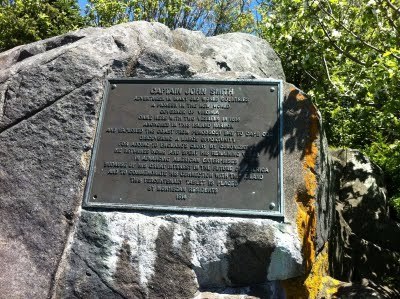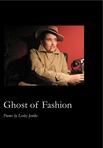Monhegan Part #1: We arrived on a beautiful, warm spring ...
 Monhegan Part #1:
Monhegan Part #1: We arrived on a beautiful, warm spring day. The dock stunk of lobster traps (a similar smell, as it turns out, to wet dog) and was lined with dusty pick ups. Folks seemed to be greeting each other after a long absence. The land, compared to late May Ohio, was bare and grudging. The light was a very pale yellow. I immediately thought of THIS painting, a painting I'd always assumed came from some desolate corner of the Midwest, but, as it turns out, the Wyeths spent a lot of time in Maine generally and Monhegan specifically. The distant house the girl in the painting reaches for suddenly made sense in Monhegan's weirdly beautiful and desolate context: this is a difficult place.
Our hostess found us and packed us into her truck after another woman had grabbed up our luggage and promised to drop it near our cabin in an hour or so. We bounced up the one main road and as we passed through the village, I noticed a visceral buzz of activity, as if everybody had been shut up inside for months and here at last was an opportunity to build, mend, dig, saw, cut and weed; the weather had obviously made a turn for the better.
And everything seemed so small. I don't know if it was the scale of the cliffs compared to the saltboxes (some winterized, some not) folks had built precariously in a place where nature trumps all, or the snug harbor itself, just big enough for a few small boats, that against the backdrop of an immense North Atlantic helped transform the scene into a treatise on man's folly.
I don't mean to be overly romantic—or maybe I do--but for the next several days we had fog, a deliciously gothic fog that enveloped every sunrise.
Yes, we spent two weeks on Prospero's island and I managed to write at least a little everyday. My lines got increasingly longer and maybe even a bit prosy—probably thanks to the fact that I started reading fiction (and only fiction) again: Jane Smiley's A Thousand Acres, Arthur Phillips' Tragedy of Arthur, Henry James' The Aspern Papers.
The through-line, Dear Readers, is of course the palpable absence of some sought-after, long-dead author (Shakespeare? Aspern? Keats?), and/or the manifestations said long-dead author's very real, infernal/eternal legacy.
I couldn't stay on Monhegan and not think about The Tempest or Twelfth Night. Did Shakespeare invent Monhegan, or did Monhegan invent Shakespeare?
Stay tuned to find out.



